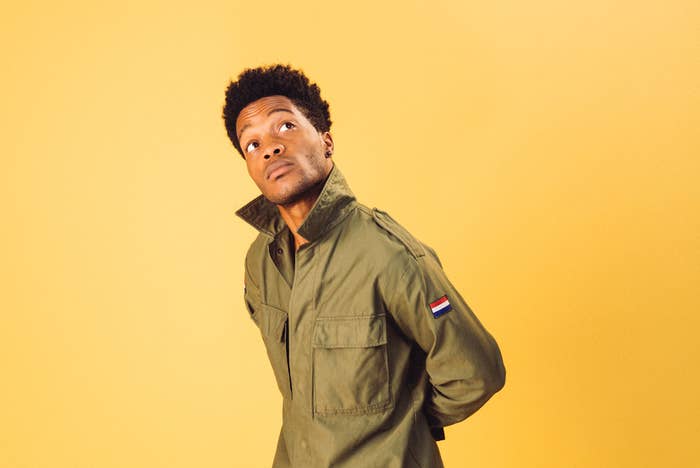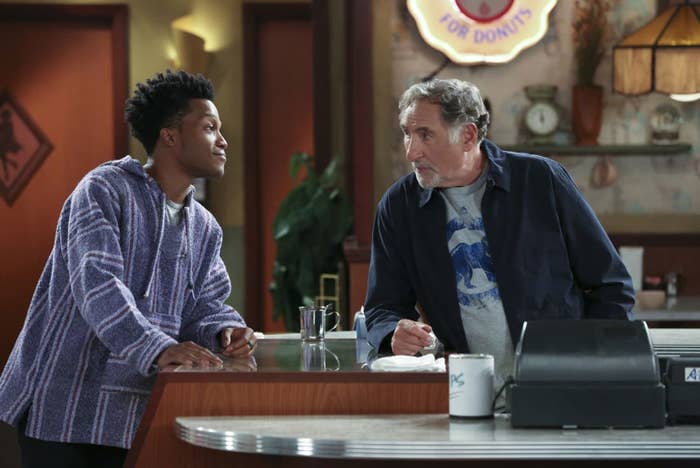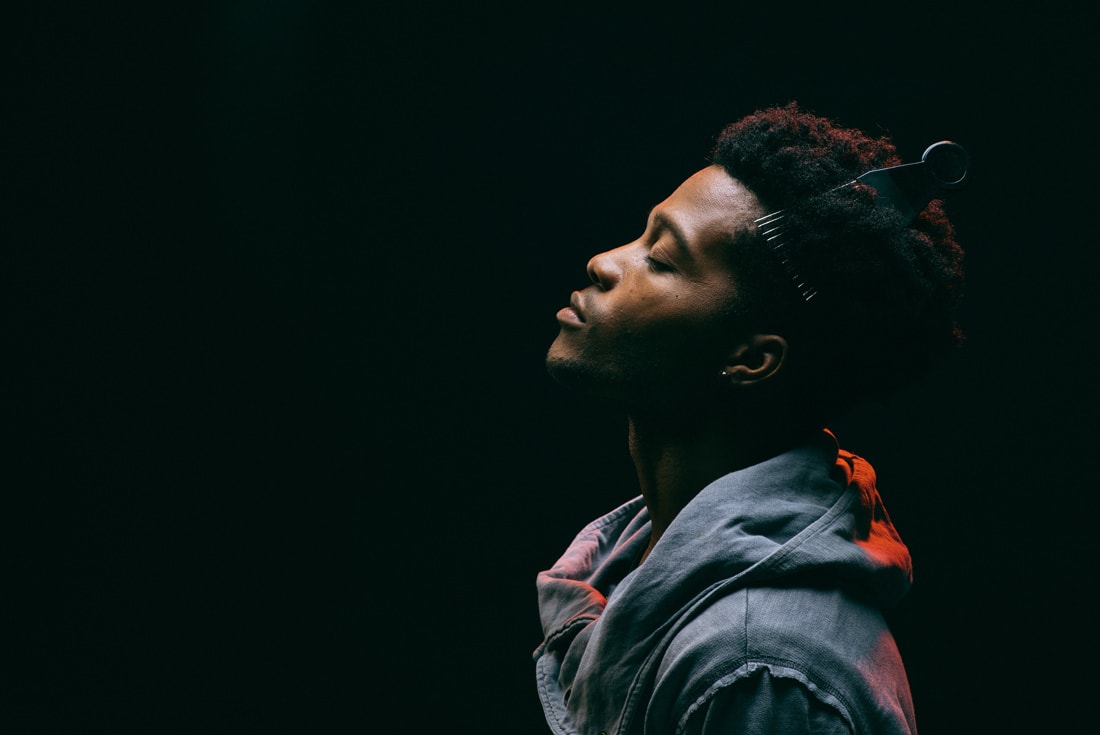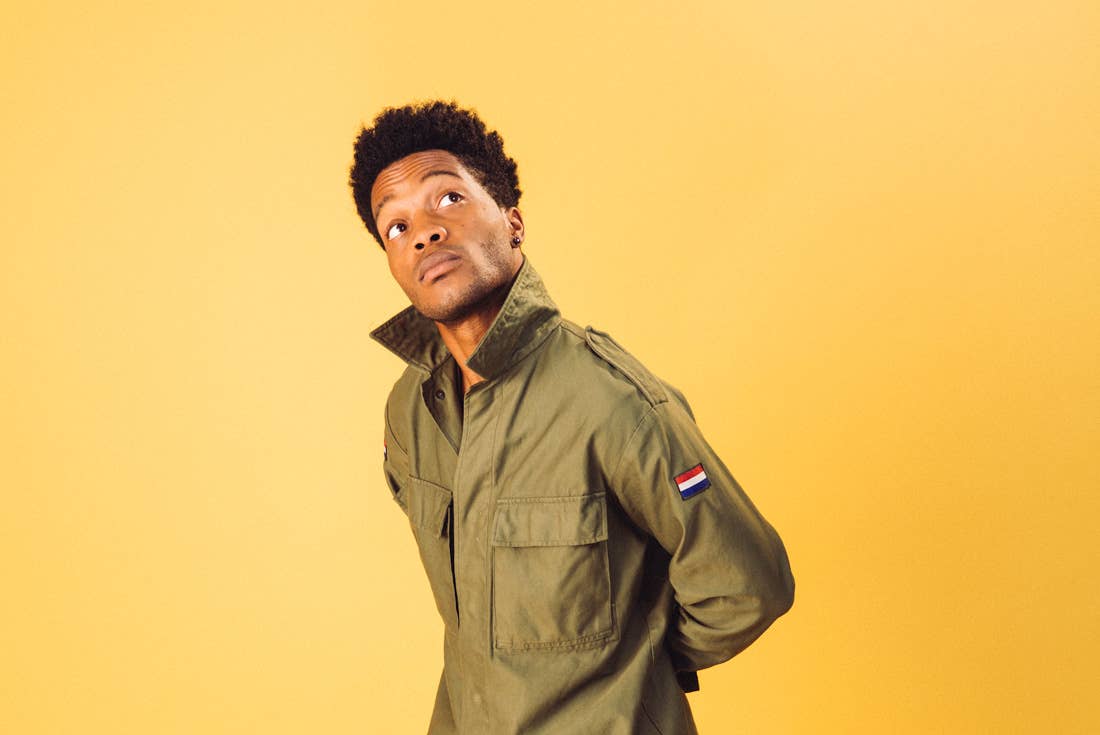
Amid the swarm of back lot soundstages and office bungalows at CBS Studios in Los Angeles’ Studio City sits a freshly architectured building, all gleam and polish, located a walk from the security gate. It’s here, on the fifth floor of the glass-and-metal construction, that comedian Jermaine Fowler has been studiously spending late nights for the past few months going tête-à-tête with fellow scribes in the writer’s room for Superior Donuts, a multi-cam sitcom debuting on the network on Feb. 2 following the confoundingly popular The Big Bang Theory.
When I arrive one prickly January afternoon, Fowler is seated in a corner conference room with some of the staff, conversing. As he gets up to show me the set—a donut shop in northern Chicago that films in front of a live studio audience—one of his colleagues leaves him with parting words: “Don’t be nervous, there’s only 200 people counting on you.”
In reality, a lot more than the cast and crew rests on Fowler’s shoulders. The 28-year-old, starring in the show as millennial wise guy Franco Wicks alongside established actors Judd Hirsch (Taxi, Dear John) and Katey Sagal (Married With Children, Sons of Anarchy), has bigger responsibilities. After filming a pilot for the autobiographical Delores & Jermaine with Whoopi Goldberg and failing to secure a series order in 2015, Fowler now stands as the only black lead actor on any of CBS’ primetime shows. It’s a late game move for CBS, which has become known as a well of Middle America gruel like Kevin Can Wait and MacGuyver, that adds minority-fronted programming to its nearly all-white schedule. It's a risk they haven't necessarily taken, and Fowler is carrying the weight of their decision to give it the green light.
Perhaps it’s CBS’s response to the growing diversity on competing networks and the success they’ve found by letting down their whitewashed guard—in the past few years, ABC struck a chord with black-ish and Fresh Off the Boat; NBC is entering its third season with The Carmichael Show; and FOX recently tapped Lee Daniels for Star, which netted a sizeable 2.2/7 rating when its pilot aired in December. CBS has started to feel off-the-pulse, the type of channel that airs shows your distant relatives love to defend at holiday dinners.
And it’s why, says Fowler, now is the perfect time to give Superior Donuts a shot. “CBS wanted the show for that reason,” he explains the next day, seated at a gastropub called Larry’s in Venice Beach, a tie-dye hoodie flipped over his hair. He first came here in 2014, strolling in off the boardwalk on the beach, ordering a burger and declaring it Los Angeles’ best. He gets us two Larry Burgers, his medium well, and offers a string of explanations as to why he thinks CBS decided to take a chance. “I feel like they had to shake things up in a way. They did with this show… Personally, I can't tell you why CBS chose right now, but I'll tell you right now the world around us right now is changing, and I feel like they wanted me in a comedy that reflected that.”

It’s a simple reasoning for Superior Donuts, a series that sees the outside world in a way that would make The Big Bang Theory blush. Adapted from Pulitzer Prize winner Tracy Letts’ play of the same name, Donuts has the old time feel of a CBS show—after all, it’s a multi-cam with a live audience that laughs right on time, every time—but it cuts through the static with a widescreen purview that tackles issues that actually feel pertinent today, like police corruption, racism and terrorism.
Superior Donuts sets the tone as intentionally edgy from the start—a joke about vaginas cements it in the first few minutes of the pilot—and it’s a concerted step forward for the network. It took a bit of time for the show to build steam, as the original pilot was shot in early 2016 and didn’t get picked up until the studio recast a few of the actors and re-shot it. But bringing it to life has its merits. What Fowler is doing for CBS in real life holds up a sort of funhouse mirror to the show’s plot: he stars as Franco, who waltzes into the donut shop owned by Arthur Przybyszewski (Hirsch) looking for a job. Even with a new Starbucks across the street stealing all the business, Przybyszewski remains stuck in his ways, rebuffing Franco’s forward-thinking ideas. In the second episode, he finally entertains Franco’s idea to make Sriracha-flavored donuts, which becomes a running gag for shop regular Carl “Tush” Tushinski, played by David Koechner (Anchorman). It’s the type of humor that millennials can nod to, and older audiences will find somewhat exotic.
Along the way, the supporting cast of regulars peppers dialogue with jocular banter that feels pertinent to now, even when it’s a soft lob. At one point, Franco goes to hang a painting in the donut shop while Officer Randy DeLuca (Sagal) stands at the counter. “I must really trust you, I just turned my back on a Chicago cop.” She retorts: “I’m not going to shoot you. I have my body cam on!”
Whether or not the show is any good is up to the viewing audience—some reviewers have so far compared it to the hammy Chico and the Man, a 1970s TV comedy with a similar plot—but Fowler is committed to delivering a show that shies away from characters that feed into stereotypes, and rather focuses on confronting them. “As a black actor on a TV show like this, I do feel a certain responsibility,” he says. “I want to make sure this Franco character is fresh as hell. And as awesome as this is, like, I'm the first black lead in a CBS network sitcom in so many years… I'm not sure who was the last one before me. You know, there hasn't been one in a very long time. That's sad.”

For Fowler, bringing Donuts to life marks his first successful turn in network television, and a pivot away from his foundation-setting stand-up career. Hailing from Maryland, he was born to a 16-year-old mom and 17-year-old dad—“Society, they look down on teenage moms and dads, but I think those people are just jealous, because they’ll never know what it’s like to be raised by someone who’s still being raised,” he joked during a routine on The Late Late Show in 2014.
He grew up idolizing comedians like Richard Pryor, Dave Chappelle and Eddie Murphy, studying movies like Happy Gilmore and Friday. (“It’s hands-down the greatest comedy ever made,” he says of the latter as we later walk across the Venice boardwalk.) They’ve helped shape his approach to stand-up, which he started doing at 17, and is far less explicit. His routines are deeply personal, specifically mining from his family life including anecdotes about his twin brother Jerome, who he describes as his “complete opposite”—“He loved going to jail,” he quipped in one routine—or his mother, who came out as a lesbian when he was 20.
After dabbling in CollegeHumor Originals and popping up on The Eric Andre Show and MTV’s Guy Code in the early ‘10s, Fowler landed his first serious recurring role on truTV’s sketch comedy show Friends of the People. He filmed his first-ever stand-up special Give Em Hell Kid that Showtime later picked up and aired in 2015, though it was with Delores & Jermaine that he got a taste for network television, inspired by his real life experience of moving in with his estranged grandmother, played by Whoopi.
Only, after a pilot was ordered, it was swiftly canceled. “Most of all, I was surprised,” he says. “But it lit a fire under my ass because I was like, you know what? I can write a movie when I'm done shooting Friends of the People. So I wrote an outline and nothing really changed me. Nothing changed. The change was the show didn't get picked up, I had the time to write more projects. Nothing stopped for me.”
Fowler has an optimistic disposition, and he consistently sees the positive in everything. It’s unusual for someone who’s now considered a coastal elite in the current political climate, but it’s because he’s been chasing his dreams for years. He stares at a skate park surrounded by onlookers watching a meager handful hit ollies and talks about how Lupe Fiasco “changed [his] life.” Tomorrow, he’ll fly out to Chicago ahead of the premiere of Superior Donuts, which is less than a week away from premiering.
“At the end of the day, all you can do is make a show you like,” he says. “I don't care if nobody likes our show, because I made a show I like. I think it's a great show. In a way, that's infectious, man. People see that. And I think because of it we're going to reach an OK audience. I don't how big it's going to be, if they're going to like the show. All I can say is, I like this, I love this show. And there have been many shows that have been great that people barely watched. Let me tell you something, when things get canned or [lose] an audience, that doesn't necessarily mean that it's bad. Nothing is for sure.”

